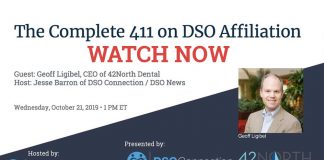Tusk Partners, a dental mergers and acquisitions advisory firm, along with W|S|W Certified Accountants, and the law firm Butler | Snow, recently presented a seminar titled “DSO and Group Practice Fundamentals”
The seminar included:
- Dental industry trends: why dentistry is so hot right now?
- Why do you want to build a group practice or DSO?
- DSO fundamentals: private equity and valuation drivers
- Maximizing the value of your group practice
- Debt funding your growth strategy: how banks make lending decisions
It covered the different dental segments (private practice, mid-market and elite groups) and where they predict things will be in five years.
They also went over EBITDA and how a solo-practice dentist is likely to value their practice differently than a bank or investor, who is interested in the cash potential of the asset. They are not interested in the revenue or net income. Attendees learned that banks will not typically lend above a 3x debt to EBITDA ratio, or approximately 4-6x the EBITDA valuation.
The presenters also stressed that you should be focused on the “why” and not the “what.” Focusing on why will dictate important things like legal strategy, ownership, growth strategy, recruiting and market spend.
Furthering on the “why,” they outlined a dentist-owned group or DSO versus a regulator compliant dental support organization. They broke down the financials of a regulatory compliant DSO with non-dentist owners, its management fee, and what the split between the DSO and PC owner typically looks like. Then they broke down hypothetical financials for an owner/founder purchasing six new locations.
Later in the presentation they outlined strategic versus financial buyers and how financial buyers are willing to pay a premium for a platform business. A platform business is a scalable business with infrastructure that can accommodate growth with relative ease. It has also shown the ability to grow through acquisitions or a de novo strategy while maintaining strong sales at existing locations. Financial buyers are looking for a company that has centralized some or all services such as a call center, accounting, marketing and revenue cycle management. A platform business must also have a strong management team and operators in need of cash to facilitate additional growth.
On the other side of the spectrum is what is not considered a platform business. This includes a newly formed collection of dental practices with little to no centralized services running on disparate systems.
The presenters then discussed the math behind DSO value creation, EBITDA and enterprise values.
The seminar covered even more than I have here. Check out the full deck below for more infightful information.
tusk-partners-presentationEditors Note: We wish to thank Tusk Partners, W|S|W Certified Accountants and Butler | Snow for making this valuable content available to DSO News readers.











